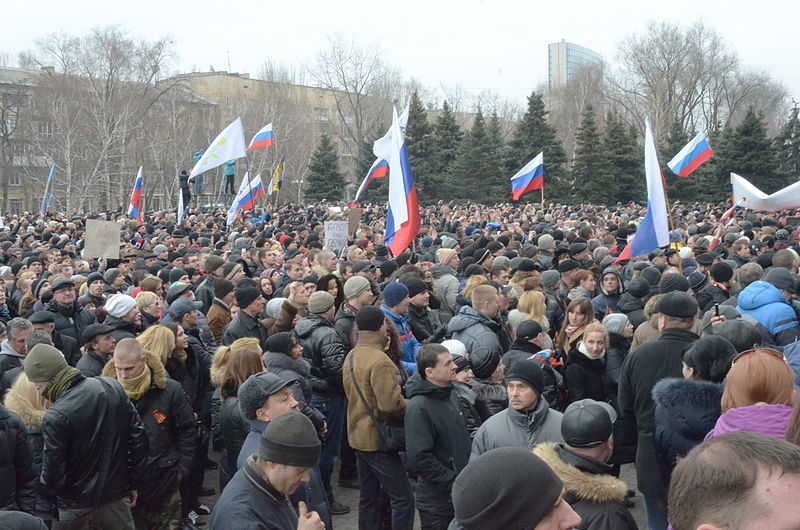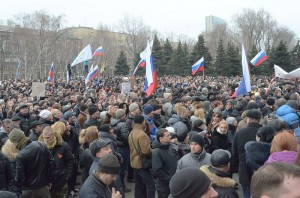

The acting president of Ukraine Oleksandr Turchynov made a public statement saying that the pro-Russian independence protesters in Donetsk, Luhansk and Kharkiv will not be prosecuted if they leave the occupied government buildings and disarm.
The acting commander-in-chief said that “in the case when people put down their weapons and free administrative buildings, we don’t need to approve laws about amnesty. We guarantee there will be no criminal prosecutions of people who put down their weapons and leave the buildings. And I am prepared to formalize it with a presidential decree,” CNN reports.
He stated that the protesters were being used by the enemies of Ukraine. The statement comes as a softened appeal after a day earlier the Ukrainian Minister of Internal Affairs Arsen Avakov said that the Ukrainian law enforcement would resolve the issue of separatist protests in eastern Ukraine within 48 hours, whether Ukraine, either by force or negotiations.
Earlier this week, Russian separatists, as if by a twist of an invisible hand – almost simultaneously stormed and occupied government buildings in Donetsk, Luhansk and Kharkiv in eastern parts of Ukraine. The entire operation lasted a few hours and followed the script of the Crimea scenario. The only difference is that the protesters were in civilian clothing rather than in military uniforms, unlike in Crimea where green-uniformed soldiers with no insignia occupied Crimea in a blitzkrieg occupation.
Perhaps, the reason is that Russia already had its military and the logistics (Black Sea Fleet) to transport them to Crimea. In eastern Ukraine, there are no Russian soldiers. Yet. The civilian protests is a precursor to invasion though. There has already been a foundation laid for the current protests. On March 1-6, before Crimea held a referendum, protesters in Donetsk had already stormed government buildings and raised Russian flags, but the Ukrainian security forces were quick to react and soon enough detained the perpetrators and reestablished control over the city.
Once the fate of Crimea was sealed, Kremlin seemingly decided to take the next step. On April 6, the separatists took over the government buildings and renewed their demands. They already claim the new entity to secede from Ukraine is called People’s Republic of Donetsk and demand an immediate referendum to decide whether Donetsk wants to join with Russia or remain in Ukraine. The representatives of the separatist movement refer to the precedent of Crimea, the secession of which has already been secured by a referendum organized by Moscow and Russian troops on the ground to protect against again Ukrainian takeover.
This week Russian government immediately issued a statement warning Ukraine not to use force against the protesters or that it would face the consequences.
In Luhansk, Russian protesters occupied several government buildings, including the Ukrainian Security Service’s regional headquarters, and seized 300 machine guns. According to media reports, they intend to secede and establish Luhansk Parliamentary Republic.
Same scenario was followed in Kharkiv where Russian separatists occupied the government buildings and declared independence of Khrakov People’s Republic.
Whether the separatists will be successful in holding referendums for independence or unification with Russia is unclear as of this moment. However, with three separate secession movements in action, President Putin has already diverted the attention of the international community from annexation of Crimea and drew the focus on Eastern Ukraine.
While the United States and its NATO allies are preoccupied with saving the eastern cities of Ukraine, Russia is already scripting new laws and economic policies for Crimea, continuing its incorporation in Russia. The rumor has it that the plan is to create a direct and permanent link between Crimea and the breakaway Transdniestr region of Moldova which has slipped out of Chisinau’s control some two decades ago. The landmass in between Transdniestria and Crimea is rich with natural resources, abundant with manufacturing capabilities Soviets had built up in the last 50 years or so, and serves as a good buffer zone against NATO.
Today the Russian Foreign Minister accused NATO of behaving as a referee and a “court-marshall” in Libya and Kosovo while disregarding the “extremist forces” in Ukraine. This is the main argument on the Russian side used to garner support for the planned invasion of Ukraine and justify annexation of Russian-speaking regions of the country.




